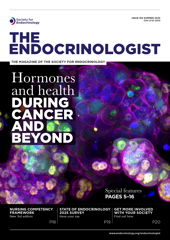Severe hypercalcaemia is a rare complication of immunotherapy and is associated with immune checkpoint inhibitor treatment. It is termed a drug-induced sarcoid-like reaction (DISR), because it mimics sarcoidosis. DISR commonly presents with bilateral hilar lymphadenopathy, cutaneous lesions, uveitis and hypercalcaemia. There are currently no specific guidelines for treating calcitriol-mediated hypercalcaemia, a form of DISR.
Dharmaputra reports the case of a 72-year-old male with metastatic melanoma, previously treated with dabrafenib–trametinib combination therapy, who presented with polydipsia, polyuria and fatigue. Biochemistry confirmed hypercalcaemia (corrected calcium 3.84mmol/l) with suppressed parathyroid hormone (1.1pmol/l) and raised phosphate (1.62mmol/l) following the second cycle of ipilimumab–nivolumab combination therapy. He had skeletal and pulmonary metastases on a background of prostate cancer and chronic kidney disease (estimated glomerular filtration rate 30ml/min/1.73m2).
Investigations revealed a significantly elevated serum calcitriol level (429pmol/l), and chest imaging demonstrated hilar lymphadenopathy consistent with DISR. He was successfully treated with intravenous fluids, subcutaneous calcitonin, denosumab and oral prednisolone.
DISR is a rare cause of hypercalcaemia following immunotherapy, which may not be associated with the same increased mortality risk. Prompt recognition and treatment with glucocorticoids and anti-resorptive agents, such as denosumab, can effectively manage calcitriol-mediated hypercalcaemia.
Read the full article in Endocrinology, Diabetes & Metabolism Case Reports EDM-24-0116 https://doi.org/10.1530/EDM-24-0116





